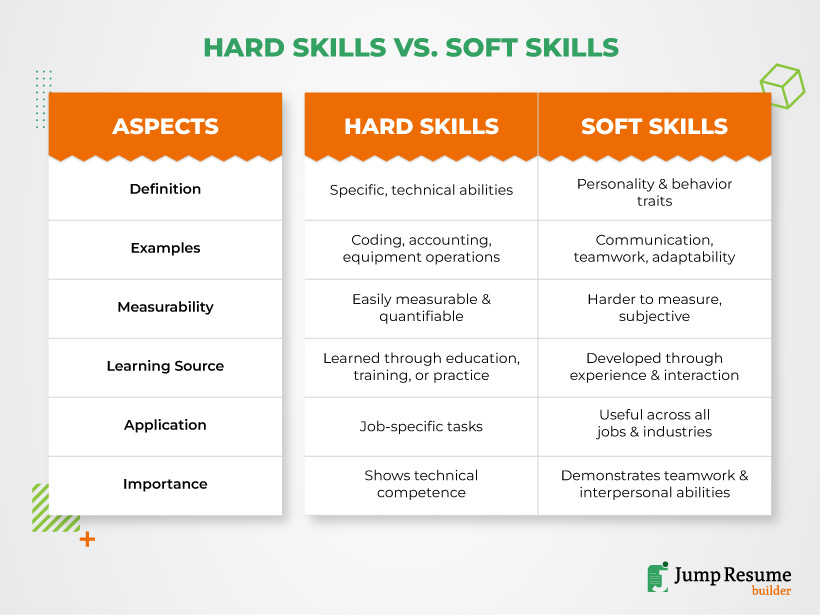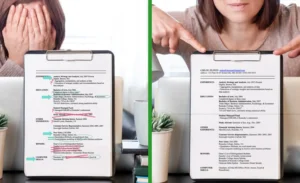- 25 Best Skills for Your Resume
- 1. Communication Skills
- 2. Leadership Skills
- 3. Problem-Solving Skills
- 4. Time Management Skills
- 5. Adaptability Skills
- 6. Technical Skills
- 7. Analytical Skills
- 8. Teamwork Skills
- 9. Creativity Skills
- 10. Attention to Detail Skills
- 11. Customer Service Skills
- 12. Project Management Skills
- 13. Critical Thinking Skills
- 14. Organization Skills
- 15. Interpersonal Skills
- 16. Computer Skills
- 17. Research Skills
- 18. Negotiation Skills
- 19. Multitasking Skills
- 20. Conflict Resolution Skills
- 21. Foreign Language Skills
- 22. Social Media Skills
- 23. Presentation Skills
- 24. Data Analysis Skills
- 25. Writing Skills
- Example Resume Skills per Job Type
- Data Analyst
- Teacher
- Software Engineer
- Healthcare Professional
- Nurse
- Mechanic
- Copy Editor
- Hard Skills vs. Soft Skills for a Resume
- What to Put on Skills on a Resume?
- Match Skills to the Job Description
- Be Honest About Your Capabilities
- Highlight Industry-Specific Expertise
- Incorporate Transferable Skills
- Quantify Your Skills With Achievements
- How to List Skills on a Resume?
- Create a Dedicated Skills Section
- Format for Maximum Readability
- Highlight Your Most Valuable Skills
- Weave Skills Throughout Your Resume
- Customize for Each Application
- Indicate Your Proficiency Levels
- Why Are Skills the Key to a Strong Resume in 2025?
- How to Learn New Skills for Your Resume?
- Online Courses
- Industry Certifications
- Volunteering
- Professional Associations
- Mentorship
- Side Projects
- Shadowing Experts
- Bottom Line
Your resume helps you make a good first impression. The skills section is very important! It shows what you can do for a company. Good skills help you get noticed and get hired.
Bosses look at resumes very quickly. Your skills need to catch their eye right away. The right skills show why you’re perfect for the job.
When you match your skills to the job description, your resume stands out. This customization helps you get past Applicant Tracking Systems (ATS) and catch the recruiter’s attention.
In this blog, we’ll walk you through how to pick the best skills to include and share tips on presenting them effectively. Let’s dive in!
25 Best Skills for Your Resume
Skills are the foundation of your professional profile. They show your abilities and how ready you are to handle specific tasks.
Here are 25 of the best skills needed in certain industries in your resume, such as:
1. Communication Skills
Being able to share ideas clearly helps in almost every job. Good communication helps you work with others and help customers.
- Who needs it: Team members, managers, salespeople, customer helpers
2. Leadership Skills
Leaders help guide and motivate people. They take charge of projects and help everyone do their best work. Good leaders make smart choices when things get tough.
- Who needs it: Managers, team leaders, bosses, healthcare professionals
3. Problem-Solving Skills
Problem-solvers find solutions when things go wrong. They stay calm under pressure and turn challenges into chances to improve.
- Who needs it: Engineers, programmers, analysts
4. Time Management Skills
Good time managers finish work efficiently. They know what to do first and meet deadlines. Companies value workers who use time wisely.
- Who needs it: Project helpers, assistants, freelancers
5. Adaptability Skills
Adaptable people learn new things quickly. They do well when things change. This flexibility helps you grow with a company.
- Who needs it: Consultants, tech workers, healthcare workers
6. Technical Skills
Technical skills involve using specific tools or machines. These vary by job and often need special training.
- Who needs it: Software makers, engineers, designers
7. Analytical Skills
Analytical people find patterns in information. They draw helpful conclusions from data to make better decisions.
- Who needs it: Data experts, financial advisors, researchers
8. Teamwork Skills
Team players work well with others. They help achieve group goals and support their coworkers.
- Who needs it: Nurses, teachers, restaurant workers
9. Creativity Skills
Creative people come up with fresh ideas. They find new ways to solve problems and help companies stand out.
- Who needs it: Designers, content creators, advertisers
10. Attention to Detail Skills
Detail-oriented people notice small but important things. They produce work without mistakes, which prevents costly errors.
- Who needs it: Accountants, editors, pharmacists
11. Customer Service Skills
Customer service skills help you understand what people need. You can handle tough situations with patience and build customer loyalty.
- Who needs it: Store workers, hotel staff, call center workers
12. Project Management Skills
Project managers plan and complete work efficiently. They organize tasks and resources to finish on time and within budget.
- Who needs it: Construction managers, IT leaders, event planners
13. Critical Thinking Skills
Critical thinkers look at information carefully before deciding. They consider different viewpoints to find the best solutions.
- Who needs it: Lawyers, doctors, teachers
14. Organization Skills
Organized people keep their work in order. They track information efficiently, which saves time and reduces stress.
- Who needs it: Assistants, coordinators, librarians
15. Interpersonal Skills
People skills help you connect with others. You can build relationships and solve conflicts to create a positive workplace.
- Who needs it: HR workers, salespeople, teachers
16. Computer Skills
Basic computer skills are needed in most jobs today. These include email, typing documents, and using spreadsheets.
- Who needs it: Office workers, marketers, accountants
17. Research Skills
Research skills help you find and check information. You can gather facts from different places to make good decisions.
- Who needs it: Scientists, reporters, researchers, journalists
18. Negotiation Skills
Good negotiators find solutions that work for everyone. They communicate well and listen carefully to close deals and solve problems.
- Who needs it: Salespeople, lawyers, real estate agents
19. Multitasking Skills
Multitaskers can work on several things at once while keeping quality high. This helps meet different deadlines efficiently.
- Who needs it: Assistants, nurses, event planners
20. Conflict Resolution Skills
Conflict resolution creates harmony at work. You can address disagreements in helpful ways to maintain good relationships.
- Who needs it: HR specialists, managers, teachers
21. Foreign Language Skills
Language skills open doors to global opportunities. They help you talk with people from different cultures and give you an edge in business.
- Who needs it: Translators, tour guides, international salespeople
22. Social Media Skills
Social media skills help businesses connect with audiences. You can create engaging content and track how well it’s working.
- Who needs it: Social media managers, digital marketers, PR specialists
23. Presentation Skills
Presentation skills help you share ideas clearly. You can engage audiences and persuade decision-makers.
- Who needs it: Sales executives, teachers, marketers
24. Data Analysis Skills
Data analysts find insights in numbers. They spot trends and make predictions to help businesses improve.
- Who needs it: Financial analysts, researchers, data scientists
25. Writing Skills
Good writers communicate clearly and convincingly. They can adjust their style for different readers to improve professional communication.
- Who needs it: Writers, journalists, editors
Suggested Reads: How to Make a Resume: Step-by-Step Writing Guide for 2025

Example Resume Skills per Job Type
Let’s explore some examples of resume skills for different types of jobs.
Data Analyst
Data analysts turn raw data into useful insights that help businesses make decisions. They use technical skills and analytical thinking to find patterns and trends.
- Hard Skills: SQL, Python, Data Visualization, Statistical Analysis, Excel
- Soft Skills: Problem-Solving, Attention to Detail, Communication, Critical Thinking
Teacher
Teachers educate and inspire students of all ages. They create fun and engaging learning environments. As this will adjust their methods to meet the needs of different students.
- Hard Skills: Curriculum Development, Assessment Methods, Educational Technology, Lesson Planning
- Soft Skills: Patience, Communication, Leadership, Adaptability, Creativity
Software Engineer
Software engineers design, build, and maintain computer programs and systems. They work with teams to create efficient and scalable solutions to complex problems.
- Hard Skills: Java, Python, Cloud Computing, DevOps, Version Control
- Soft Skills: Problem-Solving, Teamwork, Time Management, Analytical Thinking
Healthcare Professional
Healthcare professionals provide medical care and support to patients. They work in different settings to promote health, prevent diseases, and treat illnesses.
- Hard Skills: Patient Assessment, Medical Terminology, Electronic Health Records, First Aid
- Soft Skills: Empathy, Communication, Attention to Detail, Stress Management
Nurse
Nurses take care of patients and act as the main connection between patients and other healthcare providers. They combine clinical skills with a caring approach.
- Hard Skills: Patient Care, Medication Administration, Vital Signs Monitoring, Medical Equipment
- Soft Skills: Compassion, Critical Thinking, Communication, Teamwork, Adaptability
Mechanic
Mechanics diagnose, repair, and maintain vehicles and machinery. They use technical knowledge and problem-solving skills to keep equipment running smoothly.
- Hard Skills: Diagnostics, Welding, Electrical Systems, Engine Repair, Tool Proficiency
- Soft Skills: Problem-Solving, Attention to Detail, Customer Service, Reliability
Copy Editor
Copy editors improve written content to make it clear, accurate, and consistent. They ensure the text follows style guidelines and is ready for publishing.
- Hard Skills: Grammar Expertise, Style Guide Knowledge, Fact-Checking, Proofreading
- Soft Skills: Attention to Detail, Time Management, Communication, Critical Thinking
Check out the free resume templates of Jump Resume Builder to showcase your skills.
Hard Skills vs. Soft Skills for a Resume
It’s important to understand the difference between hard and soft skills. Hard skills are specific, teachable abilities. These include technical knowledge or specialized training, like coding, accounting, or operating equipment.
On the other hand, soft skills are about personality and behavior. They show how you work with others. Examples include communication, teamwork, and adaptability. These skills are useful in almost any job or industry.
A strong resume should include both types of skills. Hard skills prove you can do specific tasks, while soft skills show you’ll fit well into a team. The best candidates have a good balance of both.
Most recruiters look for this balance too. Technical skills alone aren’t enough these days. Employers want well-rounded candidates who also have strong people skills. Your resume should highlight this versatility.
What to Put on Skills on a Resume?
Your resume skills section can make or break your job application. So, wisely choose the right skills. Show them clearly and make a strong impression.
Match Skills to the Job Description
- Prioritize what employers want: Look at skills listed in the job posting.
- Analyze the listing structure: Skills mentioned first matter most.
- Use keyword alignment: Use the exact terms from the job post.
- Consider all needs: Look for hidden skill requirements too.
Be Honest About Your Capabilities
- Only list skills you have.
- Prepare real examples of using each skill.
- Know your skill level before claiming advanced skills.
- Choose quality over quantity, and avoid padding your list.
Highlight Industry-Specific Expertise
- Show specialized knowledge for your field.
- List technical skills that add immediate value.
- Include your certifications and special training.
- Mention tools and tech used in your industry.
Incorporate Transferable Skills
- Add skills that work in many jobs.
- Show problem-solving skills useful anywhere.
- Highlight communication skills that help teams work well.
- Prove your adaptability with examples.
Quantify Your Skills With Achievements
- Use clear numbers: “Boosted sales by 45% using new methods.”
- Add time frames: “Cut costs by 30% in just two months.”
- Show your reach: “Trained 15 staff members on new software.”
- Link skills to results: “Used data skills to bring in $50K new revenue.”
Indeed, your skills section proves your value. Each skill helps show why you’re perfect for the job.
How to List Skills on a Resume?
Presenting your skills effectively can make your resume stand out to hiring managers. The right format and placement help your skills catch their attention.
Create a Dedicated Skills Section
- Place it near the top of your resume for easy visibility.
- Use clear headings like “Core Competencies” or “Professional Skills.”
- Keep it short and include 8–12 of your most relevant skills.
- Make it easy to read by using consistent formatting.
Format for Maximum Readability
- Use bullet points to organize skills neatly.
- Group similar skills into categories for better flow.
- Keep spacing consistent between each skill.
- Use a two- or three-column layout to save space and improve readability.
Highlight Your Most Valuable Skills
- Bold your strongest skills that match the job requirements.
- Place your top skills at the beginning of each category.
- Use descriptive phrases instead of single words when needed.
- Add skill level indicators (e.g., “Advanced,” “Intermediate”) if it strengthens your case.
Weave Skills Throughout Your Resume
- Include key skills in your professional summary.
- Show how you’ve used skills in your job descriptions.
- Highlight skills in your achievements and work history.
- Connect skills to measurable results to show their impact.
Customize for Each Application
- Research what each employer is looking for.
- Check the job posting for required and preferred skills.
- Rearrange your skills list to match the employer’s priorities.
- Add or remove skills based on the job’s specific needs.
Indicate Your Proficiency Levels
- Use clear terms like “Advanced,” “Intermediate,” or “Proficient.”
- Show how your skills have improved over time, if relevant.
- Include years of experience for technical skills.
- Mention certifications that prove your skill level.
Your skills section should act as a quick guide for recruiters, showing them you have exactly what they need. When done well, it becomes one of the most powerful parts of your resume.
Why Are Skills the Key to a Strong Resume in 2025?
Automation is changing how companies hire people. Many companies scan resumes for specific skills using ATS (Applicant Tracking Systems). It might get overlooked if your resume doesn’t include the right keywords. Skills act as these important keywords.
Remote work has also made skills more important than degrees or credentials. Employers now focus on what you can do, not just where you learned it. However, skills directly show your abilities and prove you can do the job.
With technology changing so fast, continuous learning is essential. Adding new skills to your resume shows you’re keeping up with trends. This adaptability is highly valued because it shows you have potential for the future.
Companies want employees who can grow and adapt. Being able to learn new skills quickly is a big advantage. This flexibility helps businesses stay competitive and handle changes in the market.
In fact, skills also give clear proof of what you can do. They are more specific than general work experience. Employers can better imagine how you’ll contribute to their team when they see your skills. As a result, this reduces the risk of hiring the wrong person.
Read More: Resume Layout: Examples and Best How-To Tips
How to Learn New Skills for Your Resume?
Learning new skills can make your resume stand out. Here are some practical ways to develop skills that employers value:
Online Courses
Online courses are a flexible way to learn new skills. Platforms like Coursera and LinkedIn Learning offer structured lessons. Many courses even provide certificates when you finish, which you can add to your resume.
Industry Certifications
Certifications are a great way to prove your expertise. They show employers that you have official knowledge in a specific area. Certifications also demonstrate your commitment to learning and growing in your field.
Volunteering
Volunteering lets you practice new skills in real-world situations. It helps you gain confidence and adds meaningful experience to your resume. Plus, it shows employers that you can apply your skills in practical ways.
Professional Associations
Joining professional associations can help you learn industry-specific skills. These groups often offer workshops, resources, and networking opportunities. The connections you make can even lead to job offers.
Mentorship
Working with a mentor can speed up your learning. Experienced professionals can guide you, share practical tips, and give feedback. This helps you improve your skills faster and more effectively.
Side Projects
Side projects let you learn by doing. They give you the chance to experiment and create something new. These projects can become part of your portfolio, showing employers what you can do.
Shadowing Experts
Spend time shadowing experts in your field. Watch how they use their skills every day and ask questions about their methods. This gives you valuable insights and helps you understand how to apply your skills in real situations.
Bottom Line
The skills section of your resume plays a big role in hiring decisions. The right skills grab employers’ attention and show your value clearly. They also help you stand out from other candidates.
To make the most impact, include a mix of hard skills (technical abilities) and soft skills (people skills). Tailor your skills list for each job application. Show how you’ve used these skills in the past, and provide specific examples whenever possible.
Keep learning and adding new skills regularly. The job market is always changing, and your skills should grow. So, staying committed to learning makes you a stronger candidate.
It is your skills that tell employers what you can bring to the table right away. They also show your potential to grow in the future. When you highlight the right skills effectively, your resume becomes a powerful tool to move your career forward.
Your skills define your professional potential—make sure they stand out.
Jump Resume Builder helps you present them clearly, making a strong impression on employers. Whether you’re applying for your first job or advancing your career, create a resume that speaks for itself.
Start now, create your resume with Jump Resume Builder, and put your best skills forward!
- 25 Best Skills for Your Resume
- 1. Communication Skills
- 2. Leadership Skills
- 3. Problem-Solving Skills
- 4. Time Management Skills
- 5. Adaptability Skills
- 6. Technical Skills
- 7. Analytical Skills
- 8. Teamwork Skills
- 9. Creativity Skills
- 10. Attention to Detail Skills
- 11. Customer Service Skills
- 12. Project Management Skills
- 13. Critical Thinking Skills
- 14. Organization Skills
- 15. Interpersonal Skills
- 16. Computer Skills
- 17. Research Skills
- 18. Negotiation Skills
- 19. Multitasking Skills
- 20. Conflict Resolution Skills
- 21. Foreign Language Skills
- 22. Social Media Skills
- 23. Presentation Skills
- 24. Data Analysis Skills
- 25. Writing Skills
- Example Resume Skills per Job Type
- Data Analyst
- Teacher
- Software Engineer
- Healthcare Professional
- Nurse
- Mechanic
- Copy Editor
- Hard Skills vs. Soft Skills for a Resume
- What to Put on Skills on a Resume?
- Match Skills to the Job Description
- Be Honest About Your Capabilities
- Highlight Industry-Specific Expertise
- Incorporate Transferable Skills
- Quantify Your Skills With Achievements
- How to List Skills on a Resume?
- Create a Dedicated Skills Section
- Format for Maximum Readability
- Highlight Your Most Valuable Skills
- Weave Skills Throughout Your Resume
- Customize for Each Application
- Indicate Your Proficiency Levels
- Why Are Skills the Key to a Strong Resume in 2025?
- How to Learn New Skills for Your Resume?
- Online Courses
- Industry Certifications
- Volunteering
- Professional Associations
- Mentorship
- Side Projects
- Shadowing Experts
- Bottom Line




